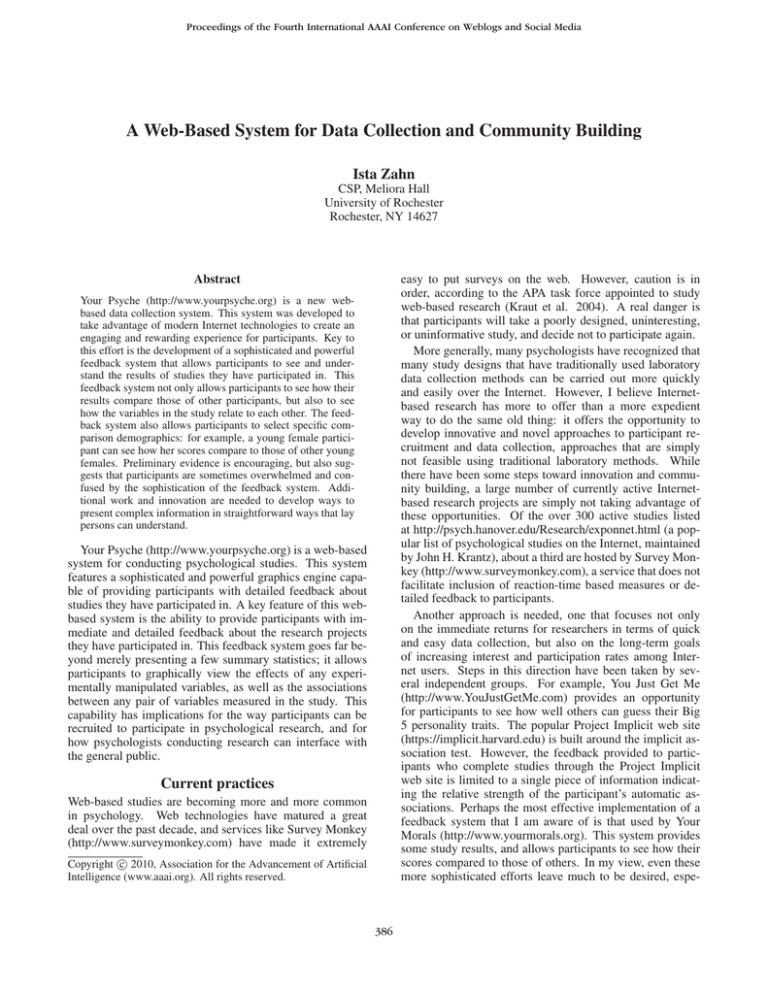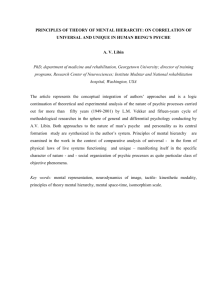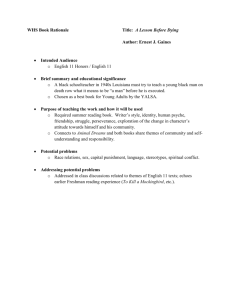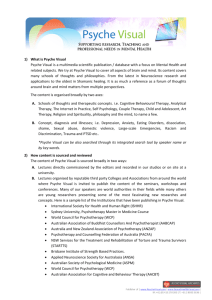
Proceedings of the Fourth International AAAI Conference on Weblogs and Social Media
A Web-Based System for Data Collection and Community Building
Ista Zahn
CSP, Meliora Hall
University of Rochester
Rochester, NY 14627
easy to put surveys on the web. However, caution is in
order, according to the APA task force appointed to study
web-based research (Kraut et al. 2004). A real danger is
that participants will take a poorly designed, uninteresting,
or uninformative study, and decide not to participate again.
More generally, many psychologists have recognized that
many study designs that have traditionally used laboratory
data collection methods can be carried out more quickly
and easily over the Internet. However, I believe Internetbased research has more to offer than a more expedient
way to do the same old thing: it offers the opportunity to
develop innovative and novel approaches to participant recruitment and data collection, approaches that are simply
not feasible using traditional laboratory methods. While
there have been some steps toward innovation and community building, a large number of currently active Internetbased research projects are simply not taking advantage of
these opportunities. Of the over 300 active studies listed
at http://psych.hanover.edu/Research/exponnet.html (a popular list of psychological studies on the Internet, maintained
by John H. Krantz), about a third are hosted by Survey Monkey (http://www.surveymonkey.com), a service that does not
facilitate inclusion of reaction-time based measures or detailed feedback to participants.
Another approach is needed, one that focuses not only
on the immediate returns for researchers in terms of quick
and easy data collection, but also on the long-term goals
of increasing interest and participation rates among Internet users. Steps in this direction have been taken by several independent groups. For example, You Just Get Me
(http://www.YouJustGetMe.com) provides an opportunity
for participants to see how well others can guess their Big
5 personality traits. The popular Project Implicit web site
(https://implicit.harvard.edu) is built around the implicit association test. However, the feedback provided to participants who complete studies through the Project Implicit
web site is limited to a single piece of information indicating the relative strength of the participant’s automatic associations. Perhaps the most effective implementation of a
feedback system that I am aware of is that used by Your
Morals (http://www.yourmorals.org). This system provides
some study results, and allows participants to see how their
scores compared to those of others. In my view, even these
more sophisticated efforts leave much to be desired, espe-
Abstract
Your Psyche (http://www.yourpsyche.org) is a new webbased data collection system. This system was developed to
take advantage of modern Internet technologies to create an
engaging and rewarding experience for participants. Key to
this effort is the development of a sophisticated and powerful
feedback system that allows participants to see and understand the results of studies they have participated in. This
feedback system not only allows participants to see how their
results compare those of other participants, but also to see
how the variables in the study relate to each other. The feedback system also allows participants to select specific comparison demographics: for example, a young female participant can see how her scores compare to those of other young
females. Preliminary evidence is encouraging, but also suggests that participants are sometimes overwhelmed and confused by the sophistication of the feedback system. Additional work and innovation are needed to develop ways to
present complex information in straightforward ways that lay
persons can understand.
Your Psyche (http://www.yourpsyche.org) is a web-based
system for conducting psychological studies. This system
features a sophisticated and powerful graphics engine capable of providing participants with detailed feedback about
studies they have participated in. A key feature of this webbased system is the ability to provide participants with immediate and detailed feedback about the research projects
they have participated in. This feedback system goes far beyond merely presenting a few summary statistics; it allows
participants to graphically view the effects of any experimentally manipulated variables, as well as the associations
between any pair of variables measured in the study. This
capability has implications for the way participants can be
recruited to participate in psychological research, and for
how psychologists conducting research can interface with
the general public.
Current practices
Web-based studies are becoming more and more common
in psychology. Web technologies have matured a great
deal over the past decade, and services like Survey Monkey
(http://www.surveymonkey.com) have made it extremely
c 2010, Association for the Advancement of Artificial
Copyright Intelligence (www.aaai.org). All rights reserved.
386
cially in terms of the quality and sophistication of the available feedback. In light of this, I have recently created Your
Psyche (http://www.yourpsyche.org). Your Psyche tries to
take the best ideas from existing Internet-based data collection systems and build on them to create a truly engaging
and interesting experience for participants, and to create a
general-purpose framework for researchers to collect data in
a wide variety of formats and on a wide variety of topics.
demographics. Many of these features are already being
used in existing web-based data collection systems. What
makes Your Psyche interesting and novel is the combination
of these capabilities and the enhancements that have been
made to them. In particular, the the feedback mechanism
represents a considerable advance in that it allows participants to select the specific information they wish to see.
For example, participants can choose to see how their scores
compare to other participants of their own age and gender, a
capability that to the best of my knowledge is only available
from Your Psyche.
Guiding principles
The design of Your Psyche has been based on two guiding principles. First, the web site design was inspired by
the recent rapid advancements in Internet-based technology
more generally. In an age when you can write your term
papers on-line using Google docs, on-line studies need to
do more than replicate the experience of filling out a paper and pencil questionnaire. We can and should incorporate multimedia, interactive reaction-time tasks, and other
modern technologies to create interesting and engaging experiences for our participants. We also can and should use
modern web-development technologies and techniques, including dynamically generated and interactive pages.
Second, Your Psyche was designed around the idea that
feedback can be motivating, interesting, and valuable. Most
existing efforts to provide feedback to participants are fairly
rudimentary. Modern web technologies enable us to go far
beyond simple static scoring algorithms to create dynamic,
interactive, and exciting feedback to participants.
Summary and directions for future work
Your Psyche is a modern, interactive web site that capitalizes on current web technologies. It incorporates the best
features and ideas from previous efforts, and I believe it
to be one of the most sophisticated data collection systems
around. However, much remains to be done. First and most
importantly, the effectiveness of detailed participant feedback as a motive to participate in studies hosted on Your
Psyche has not yet been demonstrated. Research addressing this critical question is under way, but the results are
unavailable at the time of this writing. Second, despite initial vows to limit studies on Your Psyche to those that could
be completed in under twenty minutes, some of the studies
currently running on the web site exceed this limit, with predictable results, i.e., high dropout rates. Moving forward,
it is important to ensure that only relatively brief studies be
allowed on the web site.
Finally, while there has been some interest in the project,
it is important to do a better job of publicizing and promoting the service. Although much remains to be done, Your
Psyche already represents an important advance in the way
feedback in web-based studies can be presented to research
participants.
Implementation and capabilities
Your Psyche incorporates many of the advanced features of
other web sites, and improves on them. This has been accomplished in large part by resisting the temptation to reinvent the wheel; where possible, Your Psyche incorporates
and builds on existing open source software projects.
Building on top of existing projects has a number of important advantages. By building the main portal on the Drupal (Buytaert 2010) code base, Your Psyche is able to leverage an existing user account system, which enables feedback persistence so that participants can return to the web
site at any time after completing a study and view the most
up-to-date comparison information. By using Lime Survey
(Schmitz 2010) to provide the survey engine, Your Psyche
is able to harness the result of thousands of man hours spent
developing that software, including conditional branching,
complex question types, and more. The web site uses PXLab
(Irtel 2008) to provide flexible reaction-time based measures. Finally by using R (R Development Core Team 2010)
and ggplot2 (Wickham 2009) to generate feedback for participants, Your Psyche is able to provide graphical displays
at the cutting edge of modern graphical theory and implementation.
In summary, key features and capabilities include: 1) a
user registration system that enables feedback persistence,
2) conditional branching and random assignment to different conditions or question orders, 3) reaction-time based
measures and tasks, and 4) a sophisticated feedback system
that allows participants to compare their scores to specific
References
Buytaert, D.
2010.
Drupal [computer software].
http://www.drupal.org.
Irtel, H. 2008. Pxlab: The psychological experiments laboratory [computer software]. Available from
http://www.pxlab.de.
Kraut, R.; Olson, J.; Banaji, M.; Bruckman, A.; Cohen,
J.; and Couper, M. 2004. Psychological research online:
Report of board of scientific affairs’ advisory group on the
conduct of research on the internet. American Psychologist
59:105–117.
R Development Core Team. 2010. R: A Language and Environment for Statistical Computing [computer software].
R Foundation for Statistical Computing, Vienna, Austria.
ISBN 3-900051-07-0.
Schmitz, C. 2010. Limesurvey [computer software].
http://www.limesurvey.org.
Wickham, H. 2009. ggplot2: elegant graphics for data
analysis. Springer New York.
387

![Met. ‘Cupid and Psyche’: Apul. 4.27-6.24 [Discussion]](http://s2.studylib.net/store/data/012946402_1-1fc30f412d6e1d87354f85147f67ea71-300x300.png)



